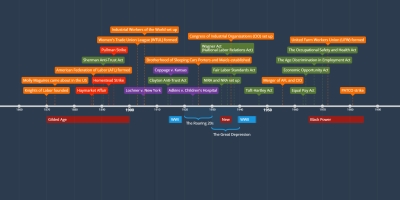11 maio 1894 ano - Pullman Strike
Descrição:
The Pullman Strike was a widespread railroad strike and boycott. which went against the Sherman Anti-Trust Act which had banned strikes. Strikers tried to disrupt communications.The economic depression which begun in 1893 led to the Pullman Palace Car Company, a manufacturer of railroad cars, to cut the already low wages of its workers by around 25%, but it didn't introduce corresponding reductions in rent and other charges at Pullman (its company town near Chicago where most of its workers lived). As a result, many workers and their families faced starvation.
George M. Pullman refused to meet with a delegation of workers trying to present their grievances about low wages, poor living conditions and 16 hour working day to the companies president. He ordered them fired and so consequently, the delegation voted to strike.
The American Railway union delegates passed a motion to initiate a boycott: ARU members would refuse to handle Pullman cars or any other trains with Pullman cars until the railroad severed their ties with the Pullman Company. The ARU's President, Eugene V. Debs. predicted that once the switch man refused to add or remove Pullman cars from trains, the railroads would fire them and try to replace them with non-union workers, and that in sum would lead to other union members to walk out in solidarity, bringing the trains to a halt.
The boycott was very effective, but Debs. was alarmed by the anger expressed by the workers, which he feared would lead to violence. After Debs. left a talk he made at a large and peaceful gathering in Blue Island, Illinois to gather support from fellow railroad workers, groups within the crowd became enraged and set fire to nearby buildings and derailed a locomotive. This upset President Cleveland as it was a mail car that was derailed, meaning the strike had now prevented the federal government from exercising one of its most important responsibilities. Cleveland sent in troops to Chicago to make sure the trains moved which would inevitably undermine the boycott as the workers rights movement had no support. The strikers were angered by this and overturned rail cars and put up barricades to prevent troops from reaching the yards. Consequently, they lost the sympathy of the public.
Union violence discouraged some workers from joining unions as they didn't want to be associated with such acts. There is evidence of union membership declining following periods of unrest. Furthermore, the unions were selective about who could join and the members were predominately skilled WASP workers.
Adicionado na linha do tempo:
Data:
11 maio 1894 ano
Agora
~ 131 years ago
